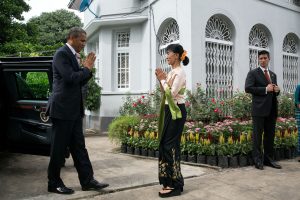A court in Myanmar has ordered the auction in March of the Yangon villa belonging to imprisoned leader Aung San Suu Kyi, where the Nobel laureate spent more than 15 years under house arrest. In a ruling on Thursday, the country’s Supreme Court ordered the property to be auctioned on March 20, with the reserve set at a scarcely believable 315 billion kyat ($90 million), The Irrawaddy reported.
“If there is a buyer, the house will be sold,” an unnamed source with knowledge of the proceedings told Reuters. “We will have to see whether there will be a buyer or not.”
The decision came after the court in August 2022 upheld a special appeal lodged by Aung San Suu Kyi’s estranged older brother, seeking half ownership of the family property.
The villa, which sits at 54 University Avenue on Inya Lake in the city’s north, was given by the government to Aung San Suu Kyi’s mother Khin Kyi after the assassination of her husband, the independence fighter Gen. Aung San, in July 1947. The family moved there in 1953, following the drowning death of her second brother at their previous home at Tower Road in Bahan township (now a museum to Aung San).
Aung San Suu Kyi spent much of her life in the home after returning to the country from abroad in 1988. It was where she served more than 15 years of house arrest, during which the home became a political shrine and totem of resistance to the military junta of the time. Comings and goings from University Avenue were tightly controlled, and as Myanmar’s political system began to open up in the late 2000s, Aung San Suu Kyi delivered a number of speeches from her front gate to crowds of supporters gathered in the street outside.
The iconic leader continued to live there after her release in 2010, until moving to Naypyidaw to take up her seat in Parliament in 2012. During this period, the villa hosted visiting dignitaries including U.S. President Barack Obama, his Secretary of State Hillary Clinton, and U.N. Secretary-General Ban Ki-moon.
At the same time, the property has been the source of an acidic and long-running family dispute between Aung San Suu Kyi and her elder brother Aung San Oo. In 2000, Aung San Oo sued her for a half-share of the home. As The Irrawaddy narrates the serpentine legal case, a Yangon court ruled in 2016 that Aung San Suu Kyi owned the two-story building and half of the land, while another building on the property and half of the land belonged to her brother, according to The Irrawaddy.
In January 2019, Aung San Oo appealed this ruling to the Supreme Court, petitioning for the home to be sold at auction and for a share of the proceeds. In August 2022, the Supreme Court upheld his appeal, by which time the military had once again seized control and Aung San Suu Kyi was in detention in Naypyidaw.
Shortly after the Supreme Court’s ruling, Duwa Lashi La, the acting president of the National Unity Government, designated the property as a cultural heritage site and prohibited its sale or destruction, under threat of legal punishment if the resistance prevails in its current war against the military. Yesterday, Kyaw Zaw, the spokesperson for the NUG President’s Office, warned any member of the public from purchasing the home. “It is illegal to [sell] the house and anyone doing it will be punished in accordance with the law. Nobody will get [to own] the house even if they [purchase it from] the military,” he said, according to the Democratic Voice of Burma.
The most striking part of the story is the value ascribed to it by the court. Even for a nearly two-acre block in one of Yangon’s most prestigious neighborhoods, this seems like a vast overestimate, equivalent to the most expensive home ever sold in Sydney, one of the world’s most expensive cities. A real estate developer quoted by The Irrawaddy in 2022 said that the villa was then worth around $27 million on the open market – but even that strains credulity. In fact, given the economic troubles currently facing Myanmar’s military junta, it is not unreasonable to assume the cash-starved administration is hoping to take a cut of the proceeds.
The interesting question is whether the property’s political overtones will encourage or discourage its sale, and whether there is anyone willing to take on such a historically freighted home at such a price.

































